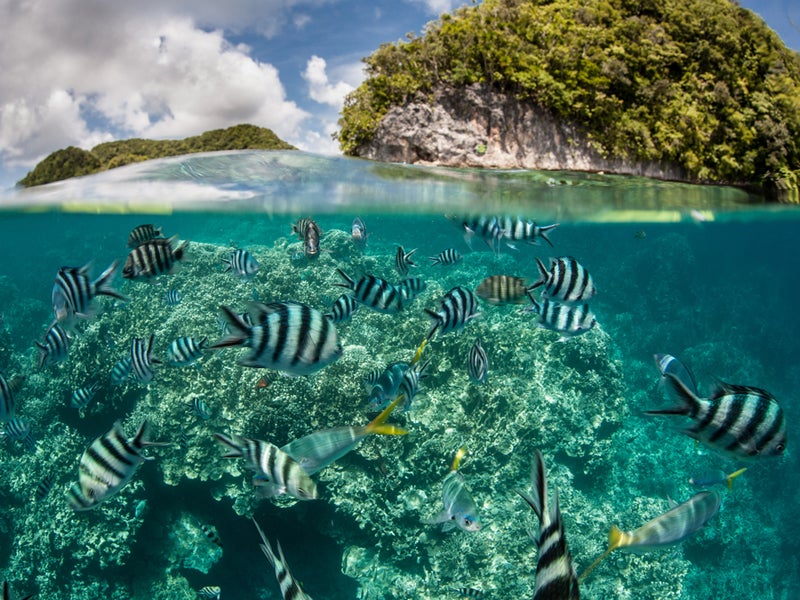Small Island Nation Makes Big Contribution to Conservation
The tiny Pacific island nation of Palau just created a marine sanctuary larger than the state of California, inspiring others to follow its lead in ocean conservation.

This page was published 10 years ago. Find the latest on Earthjustice’s work.
One bold step for a small country, one giant leap for our oceans.
Recently, the tiny Pacific island nation of Palau enacted a law setting aside 80 percent of its maritime territory—193,000 square miles of ocean—as a marine protected zone. This new sanctuary, larger than the state of California, will rank among the five biggest fully protected marine areas in the world. The area will be a “no-take” marine reserve, with no fishing, mining or drilling allowed. Meanwhile, the remaining 20 percent of Palau’s ocean will be reserved for local fishing by individuals and small businesses to supply the Palauan market.
Palau has a lot to protect. Its seas harbor more than 700 species of coral, 1300 species of fish and 130 species of rare shark and stingray. Seven of the world’s nine giant clam species live in Palau, alongside hawksbill turtles and hammerheads, dugongs and manta rays.
As a Peace Corps volunteer, I spent one year in Palau, and its beauty amazed me. I kayaked through the rock islands—stately, emerald-topped slabs of limestone that reach straight up, from turquoise sea to azure sky. I snorkeled through Jellyfish Lake, a marine lake where thousands upon thousands of (stingless!) moon jellyfish floated serenely around me. I scuba dived into the Blue Hole, floating past psychedelic corals, schools of shimmering fish and quiet, gliding reef sharks.
Judging by the visitor statistics, I’m not alone in my awe. Ecotourism comprises about half of Palau’s annual GDP. Last year, Palau welcomed 140,784 travelers—an impressive sum for a nation of just over 20,000 people. In creating this marine protected area, Palau is striving to preserve the natural beauty that entices tourists. Palau’s government hopes the sanctuary will increase the number of fish and sharks in the sea and the number of visitors on land.
What’s more, as islanders, Palauans are keenly aware of the importance of conservation. Palauans also rely on their waters to provide a healthy fish supply for food independence and security.
In 2009, Palau was a leader in the Micronesia Challenge, a regional conservation program in which they challenged neighboring nations to join them in protecting 30 percent of their marine resources by 2020. Now, says sustainable fisheries expert Cynthia Yeh, “Palau is following through on what they said they would do. They are making bold moves. With the Micronesia Challenge, they stood up first and made other countries follow.”
Our oceans are increasingly threatened by overfishing, but Palau’s new reserve and other marine sanctuaries could help reverse some stock declines. In these safe areas, fish are free to grow and spawn, allowing populations to rebound. Marine mammals are less likely to be caught and killed as by-catch. And stable animal populations help maintain stable plankton populations, which could assist with carbon cycling and decrease global warming. According to Amy Freitag, a research associate at the National Oceanic and Atmospheric Administration, “While many call the Amazon [rain forest] the lungs of the planet, there’s real evidence that phytoplankton are the lungs of the planet. You can’t talk about carbon without talking about the ocean.”
Earthjustice attorneys provided legal advice to the Palauan president and his team as they drafted and passed legislation creating the sanctuary. Earthjustice wanted to be involved in the creation of the sanctuary because of the organization’s strong commitment to fighting for ocean conservation and climate change mitigation across the globe.
“The sanctuary is a major contribution to healthy oceans and reef systems that are resilient to climate change, both for the people of Palau and for the world,” says Earthjustice attorney Erika Rosenthal.
With scores of world leaders coming together in December for climate talks in Paris, Palau is setting a commendable example for other nations and issuing a challenge that we all must answer. As Palau’s president, Tommy E. Remengesau, Jr., said before the United Nations in 2009, “How much will Palau’s efforts matter if the world is not on the same page?”
The International Program partners with organizations and communities around the world to establish, strengthen, and enforce national and international legal protections for the environment and public health.